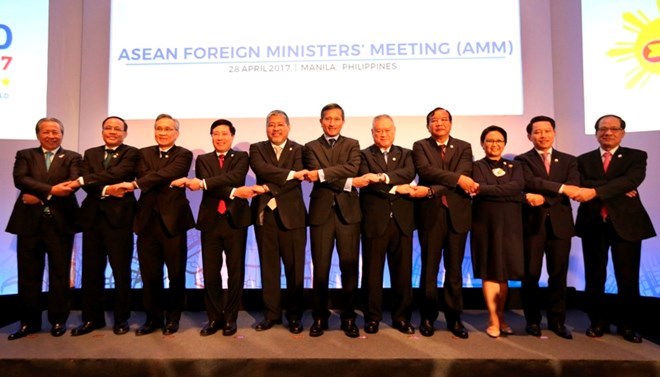ASEAN foreign ministers concerned about Korean Peninsula situation
ASEAN foreign ministers issued on April 28 a statement expressing grave concern over the escalation of tension in the Korean Peninsula, urging the Democratic People's Republic of Korea (DPRK) and all parties concerned to exercise self-restraint in order to de-escalate the tension.
 |
| ASEAN foreign ministers (Photo: VNA) |
“ASEAN is mindful that instability in the Korean Peninsula seriously impacts the region and beyond,” the statement said, urging the DPRK to comply fully with its obligations arising from all relevant United Nations Security Council (UNSC) Resolutions and international laws.
They also called for the resumption of dialogue on the Korean Peninsula to defuse tensions and create conditions conducive to peace and stability.
The Korean Peninsula situation was one of the main issues tabled at the ASEAN Foreign Ministers’ Meeting, the 15th meeting of the ASEAN Political-Security Community Council, and the 19th meeting of the ASEAN Coordinating Council in Manila, the Philippines, on April 28. These events reviewed preparations for the 30th ASEAN Summit on April 29.
Another outstanding issue discussed at the meetings was the East Sea issue. ASEAN foreign ministers reiterated the resolve to accelerate the building of a framework for a Code of Conduct (COC) in the East Sea so as to attain a substantive, effective code that is in line with international law.
The ministers stressed that amidst the complicated international and regional context, especially tensions in the Korean Peninsula and reclamation and militarisation activities in the East Sea, ASEAN need to keep a strong common voice and bring into play its role, thus practically contributing to peace and stability in the region and the world.
Speaking at the meetings, Viet Nam’s Deputy Prime Minister and Foreign Minister Pham Binh Minh shared other countries’ viewpoint on tensions in the global and regional situation. He affirmed that ASEAN needs to take a sober, impartial and consistent approach.
The bloc should consolidate its internal strength, solidarity and unanimity, increase coordination of their stance, and build a common voice for ASEAN regarding international and regional issues of shared concern. It also needs to enhance its central role in ASEAN-led mechanisms, encourage big countries’ balanced and constructive presence and participation in the region, he said.
He added the association needs to enhance people’s engagement in the building of the ASEAN Community and make use of every contribution to the community development, thus helping with common peace, stability and prosperity.
Regarding the East Sea issue, Minh shared other countries’ concern about complex developments in the waters, including reclamation and militarisation activities.
He emphasised that all countries are responsible for contributing to peace, stability, security and safety of navigation and overflight in the East Sea. Countries must be committed to settling disputes by peaceful means on the basis of respect for international law, especially the 1982 UN Convention of the Law of the Sea, along with diplomatic and legal processes in the region. They also must not use or threaten to use force.
Deputy PM Minh welcomed the continued efforts made by ASEAN and China to seriously and fully implement the Declaration on the Conduct of Parties in the East Sea (DOC), and build an effective COC both legally and in reality.
(Source: VNA)